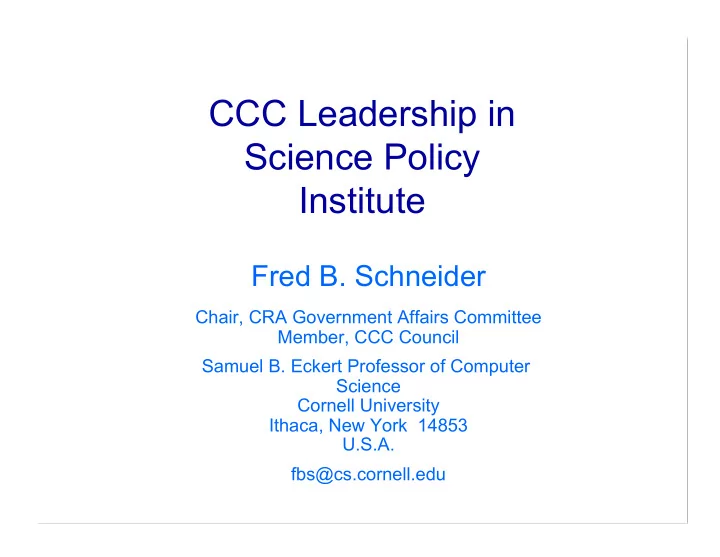

CCC Leadership in Science Policy Institute Fred B. Schneider Chair, CRA Government Affairs Committee Member, CCC Council Samuel B. Eckert Professor of Computer Science Cornell University Ithaca, New York 14853 U.S.A. fbs@cs.cornell.edu
Goals LISPI is a crash course in: – Relevant science policy issues – Mechanics of policy making § How is federal science policy crafted? § How is it implemented? – Opportunities to participate in policy-making process. Nb: Federal funds cannot be used to lobby at the federal, state, or local levels. LISPI is funded by federal funds. Any “ advocacy ” you see at LISPI is purely for purposes of illustration. Difference between “ education ” and “ lobbying ” ? 1
CRA and CCC Interfaces to DC 20 Indtrl Rsch Labs 200 PhD CS Depts 6 Prof Societies CRA Board of Directors CRA Gov affairs $ $ $ NSF CCC Council 2
Who Else Talks to DC? – Individuals – Professional societies § NAE, ACM, IEEE, …. – Business (including “ Higher Education ” ) – Consortia ( “ lobbyists ” ) 3
Why Get Involved? ● Altruism – ” Ask not what your country can do for you - ask what you can do for your country ” ● Obligation – In US, higher-ed is a public trust. ● Pragmatism – Change the environment so you can better do “ your thing ” (e.g., research, teaching, …). 4
Ways to Connect ● Advise Research Funding Agencies – Influence direction (e.g. new initiatives) – Influence operation ● Advise Other Federal Agencies – Influence what/how they operate through: § Federal Advisory Cmte Act (=FACA) advisory committees § National Research Council (=NRC) boards and studies ● Advise Congress – Advice on legislation 5
Being Effective in DC A rather different culture and tactics from a university setting… – Don ’ t seek to get credit. (You probably won ’ t.) – Compromise is typically how you win. § Understand what others are seeking and why. – Organizations / Individuals optimize for: § More budget ( “ Follow the money . ” ) § More power (or less accountability / co-dependence) § More access – Re-election requires votes. § “ All politics are local. ” 6
A Cynic ’ s view of DC Strategy Winning characteristics for initiatives : – Different trumps more – New trumps improved – Reactive trumps proactive – Inclusive trumps exclusive § 50 states, a budget crisis (=competing interests), … 7
Schedule 0830-0900: Overview 0900-1000: The Federal Case for Computing 1030-1200: The Federal Budget Process 1300-1415: Role of Advisory Committees 1445-1600: Interacting with the Agencies / Creating new Initiatives 1600-1645: Having “ The Conversation ” (I) 1700-1800: Expert Panel - Communicating the Importance of the Field 1800-1930: Reception 0830-0945: Embedding Researchers in Non-research Agencies and the White House 1000-1200: Having “ The Conversation ” (II) 1200-1230: Congressional Testimony, and Wrap-up 8
Recommend
More recommend